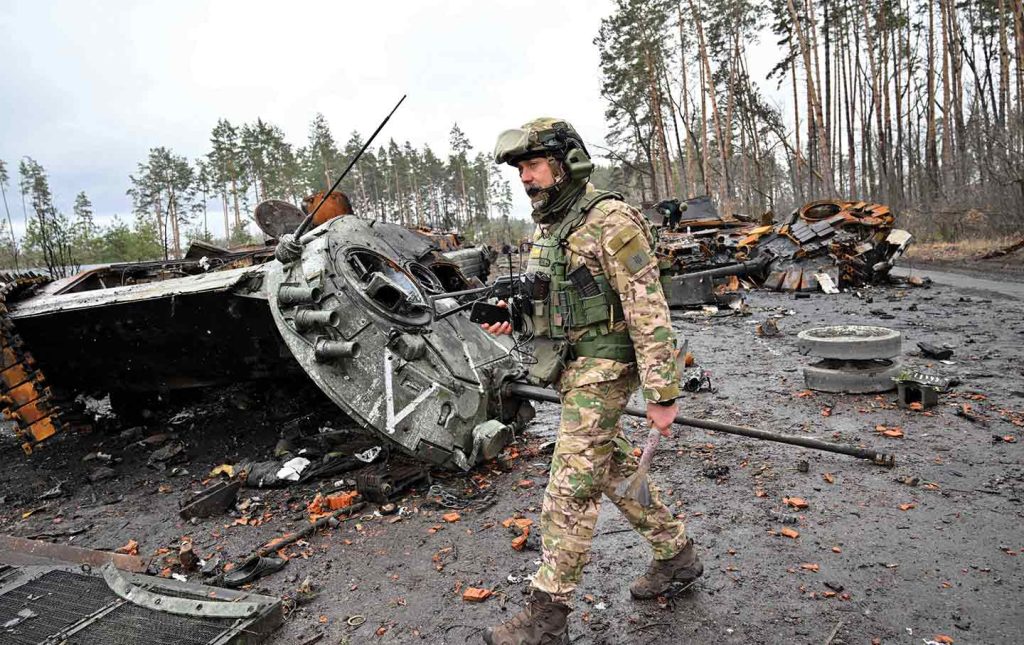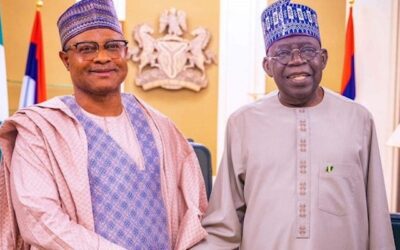Raging War in Ukraine: Negotiated Peace is the Only Solution

Since late 2021 when the Russian government started massing troops and military supplies close to the Ukrainian border, fears of war and military aggression in Eastern Europe spiked beyond any level since 2014 when same Russia annexed the Crimea region from Ukraine.
The border move was repeatedly criticized by the US government as provocative and unwarranted, as the Russian government initially announced that it was not planning any military action and berated the paranoia and war-mongering of the United States. The back and forth played on until February 24 when the Russian government finally launched a military assault on its neighbor Ukraine, in what it termed a Special Operation to protect native Russians and Russian-backed separatists from the “maltreatment, brutality and nazism” of the Ukrainian government. Before the invasion, the Kremlin (Russian Seat of Power) recognised 2 splinter republics in Eastern Ukraine called The People’s Republic of Luhansk and another one in Donetsk which they said they were protecting; a claim that served as a precursor to the aggression. That was the superficial reason given for the invasion.
However, the main reason why the invasion occurred was Russian’s opposition to the continuous eastward expansion of the US-led military alliance (NATO); an organisation that was steadily incorporating many former Soviet States into its fold. When it became apparent that Russia’s most strategic neighbor was cozying up to NATO’s overtures, the Kremlin denounced the development and asked for assurances that NATO will not admit Ukraine into its fold for apparent reasons. NATO was unwilling to provide such assurances; and the Ukrainian government was gravitating excessively towards the West; setting it on the path of what has proven to be a fatal war with Russia.
The Russian military started the war with a violent assault on the Ukrainian capital Kyiv; and Ukraine’s fearless President Volodymyr Zelensky drew global backing and support at the initial stage; with the Ukrainian Military showing remarkable courage and grit in mounting a formidable resistance and preventing the Russians from taking over the Capital. But right from the start, it was clear that the US and its NATO allies will not risk direct combat with Russia; hence they could only support Ukraine via other means which will not involve sending US or NATO troops into the country. The reality dawned on Zelensky that the war was Ukraine’s War alone.
The first show of united opposition from the West was the unprecedented financial and economic sanctions hammered on Russia, its officials and billionaire oligarchs. About half of the massive 600 billion currency reserves of Russia in US Dollars were frozen and trading with Russia was later halted with US & its NATO allies. The Russian government was defiant, it was not a stranger to economic sanctions as it faced similar in 2014 for its Crimea annexation and it was expelled from the G8.
These sanctions had an initial crushing effect on Russian economy and its currency the Ruble; but even though the volume of its various raw materials, oil and coals exports took a nosedive, Russia had a strategic advantage as it supplies up to 40% of total natural gas to Europe who depended it on it for the normal functioning of their economy. In as such; even with the sanctions, huge millions of Euros continued to flow on a daily basis into Russia from gas sales.
Next came the restriction of Russian aircrafts from the airspace of many Western countries and the massive emigration of western businesses from Russia with large tech, energy, automobile, manufacturing, commerce, retail and financial companies halting operations or suspending it; but even this had minimal impact on Russia’s military assault.
Zelensky, who was witnessing the daily loss of lives and properties then proceeded on a passionate campaign speaking virtually with the Legislature of various Western countries, seeking for help and assistance and repeatedly calling on NATO to restrict Russian aircraft or drones from Ukrainian airspace; pleas that fell on deaf ears as the West was unwilling to engage in direct combat with a nuclear power. The first six weeks of the war resulted in loss of many lives including children and the aged alongside destruction of many cities, infrastructure and monuments in Ukraine and severe difficulties in creating evacuation corridors for civilians. It also resulted in a big humanitarian crisis as millions of people fled Ukraine, majority of them seeking temporary shelter in Poland, Romania and other neigbouring countries. The Russian military also suffered setbacks but it was mostly military losses unlike Ukraine that was losing innocent civilians in large numbers. Russia succumbed to being the Black Sheep, the harbinger of the largest military assault in Europe since World War II. It has torpedoed the international order and reversed gains made in the sanctity of maintaining territorial integrity of nations which are now being swiftly eroded.
Eventually, the Russian military was unable to conquer Kyiv and it re-strategized, withdrawing its troops from the capital and focusing on besieging the Eastern region of Luhansk and Donetsk (Donbas region) and also parts of Southern Ukraine. The objective was to take over these places and create a land corridor connecting Eastern Ukraine with Crimea; with the intention of having all these areas under the control of Russia. That has not totally stopped the attacks on Kyiv as a cruise missile was directed by Russian military into the Capital miles away from where the UN Secretary General was rounding off his meeting with Zelensky just few days ago.
It became apparent that Russia was ready for a protracted war of attrition with Ukraine and it will not withdraw until it gains some sort of military triumph. Moscow’s position in the world order depends much on how this war ends and anything short of an appearance of victory will humiliate Russia on the global level. Seeing the new Russian strategy, Western nations, especially the US has ramped up the supplies of military hardware and financial aid to Ukraine, up to $3 billion in different tranches. President Joe Biden is further proposing a large military/humanitarian aid of $33 billion to Ukraine. These moves irked Moscow, which has warned Western states against further military or financial supplies to Ukraine as it is parallel to engaging in proxy war with them. Russia has been rattling Nuclear threats and sounding the alarm that anyone that crosses its path will face “speed of lightning” response.
It is glaring that continuity of the war along this trajectory will only inflict further losses of lives and properties mostly on Ukrainian citizens. The US is willing to continue pumping money into Ukraine to weaken Russia’s military might over the long-run, but on the short-run, it is not working as Russia maintains tactical and military superiority over Ukraine. The sanction weaponism has been weakened as Russia is finding ways to circumvent them and cracks are starting to emerge in the West with disagreements on certain salient issues. Under high regional pressure, the governments of Netherlands, Austria, Hungary, Germany amongst others have at different times said they can’t totally comply with the European Union sanctions to immediately halt natural gas purchases from Russia as they will not take actions that will hurt their country’s economy adversely. The plan to get more gas supplies from the US and gradually phase out reliance on Russian gas for many European countries is not going to happen overnight and for now, the dependence on Russia’s energy supplies is still fundamental to their economy. Russia has started weaponizing its gas supplies as a retaliatory move against Europe, stopping supplies to Poland & Bulgaria as they are not complying with the directive that they should pay for their purchases with the Ruble.
The price-insensitive demand for Russia’s energy and grain exports is also helping it bypass the sanctions. As the quantity of Russian exports is reduced, the global prices of those commodities increase. Russia will end up with lower export volumes but nearly the same or even higher export earnings. A recent analysis showed that Russian revenues from energy exports to the European Union soared during the first two months of the invasion despite some buyers shunning Russian energy and finding alternatives. Imports of Russian energy products by European Union states accounted for $43.6 billion from February 24 to April 24 which is more than double the value of Russian energy imported by EU states during the same period last year. Higher prices rather than volume accounted for that upsurge in earnings.
Many Asian countries apart from Japan and South Korea have also not totally cut off relationships with Russia and some degree of trading is still ongoing with Asian giants China and India. China in particular have repeatedly blamed the US for the crisis, describing the obstinate eastward expansion of NATO in contravention of agreements with Russia as the foundation of the war. The global isolation that the US and its NATO allies are proposing for Russia may not really materialize. Developing countries have also declined to join in the West’s campaign of isolation, as seen most recently in a US-led vote to remove Russia from the UN Human Rights Council. It’s true that 93 countries supported the move, but 100 other countries did not (24 opposed, 58 abstained, and 18 did not vote). Even more striking, those 100 countries are home to 76% of the world population. Countries may well have different non-ideological reasons for opposing the US initiative, including trade ties with Russia. But the fact remains that much of the world has rejected turning Russia into a global pariah, especially to the extent that the US would like.
The position of many African countries including Nigeria towards the war is a neutral standing and not explicitly support either Russia or the Western-backed Ukraine. The impact of the war has affected the global economy in its recovery from the coronavirus pandemic. Supply lines have been badly disrupted and cost of many commodities have been volatile as a result of economic sanctions. Ukraine is a strategic exporter of Wheat, Corn, Fertilisers etc. with significant volume flowing into Africa which is now affected; increasing the risk of food crisis over the coming months when current reserves are depleted.
The Nigerian government through the Foreign Affairs Ministry have maintained that it has very good diplomatic relations with Russia and Ukraine despite the war between both countries. The government also said the country does not regret abstaining from voting to suspend Russia from the UN Human Rights Council over allegations of gross human rights violations. Nigeria’s permanent representative to the UN, Prof Tijjani Muhammad-Bande similarly averred that Nigeria has been very clear from the outset that the attack was unacceptable and Nigeria stood by the World on that position. But no matter how we all feel personally, Nigeria has not broken relations with Russia and there are several existing economic and security co-operations between both countries. He further explained that Russia remains a member of the UN, a key player in global politics and that very soon, there may be cessation of the crisis between Ukraine & Russia, so it is unwise to sever relationships with any of them as it may be difficult to re-establish them. He called it a “diplomatic balancing act”.
In a recent dinner with members of the Diplomatic Corps, President Muhammadu Buhari charged the UN to continue actively leading the way for engagements that would ultimately unlock peace through diplomacy. He urged for prayers for de-escalation of the conflict and a return of peace to Ukraine. According to him “The war has lasted too long, cost too much and hurt too many people well beyond the immediate theatres. The rest of the world is progressively facing the impact of the conflict and this will certainly get worse if an immediate resolution is not found, not least in the area of food security”.
There is only one solution to the war in Ukraine; a peace deal. The US stratagem of assisting Ukraine to stymie the Russian invasion by imposing tough sanctions and by supplying Ukraine’s military with sophisticated armaments will not end the war but only drag it longer with its attendant loss of lives and mass destruction. What is needed is a peace deal, which may still be within reach. Yet to reach a deal, the United States will have to compromise on NATO, something it has so far rejected.
Talks between top officials of Ukraine and Russia have so far been stalemated with no remarkable progress being made due to unwillingness to make concessions or provide binding assurances as the case may be. Zelensky has alluded to the difficulty of sitting on the table and negotiating with those committing war crimes and genocides in Ukraine. As reprehensible as it sounds, a war is ongoing and the widescale destruction are direct or indirect consequences of this war. It will continue if the war continues. Dialogue is needed to prevent more carnage.
Putin started the war in Ukraine and has said negotiations have been deadlocked, without slamming the door on them. But before the war started, Putin presented the West with a list of demands including, most notably, a halt to NATO enlargement. The US was not willing to engage on that point. Now would be a good time to revisit that policy. Putin also would have to show a willingness to make concessions for negotiations to succeed.
America’s arms-and-sanctions approach may sound convincing in the echo chamber of US public opinion, but it doesn’t really work on the global stage and most especially in Ukraine where blood and tears continue to flow. It enjoys little support outside of the United States and Europe, and eventually may face a political backlash inside the US with the domestic economic challenges piling up. The rest of the world wants peace, not a victory by the United States or NATO in its proxy war with Russia. The US would apparently relish seeing Putin defeated militarily, and supply of NATO armaments to Ukraine have helped in dealing a huge and heavy blow to Russian forces. But Ukraine is also being destroyed in the process. Russia will not declare defeat and retreat. Russia is much more likely to escalate even potentially by using nuclear weapons. Thus, NATO arms can inflict huge costs on Russia but cannot save Ukraine.
The Turkish Government have volunteered to serve as a mediator and guarantor for direct peace talks between Putin and Zelensky and it continues to pursue that advocacy. The UN Secretary General has also been on a tour to both countries with emphasis on cessation of hostilities and creating a chance for conciliation and peace.
The crucial step is for the US, NATO allies and Ukraine to make it unambiguous that NATO will not expand into Ukraine as long as Russia stops the war and leaves Ukraine. The countries aligned with Putin, and those choosing neither side, would then say to Putin that since a commitment has been made to stop NATO’s eastward enlargement, it’s now time for Russia to leave the battlefield and return home. Of course, negotiations might fail if Russia’s demands remain unacceptable. But we should at least try, and indeed try very hard, to see whether peace can be achieved through Ukraine’s neutrality backed by international guarantees.
A continuation of the war in this current direction will produce no winners on the long run; only damaging and irreparable losses on every side.


